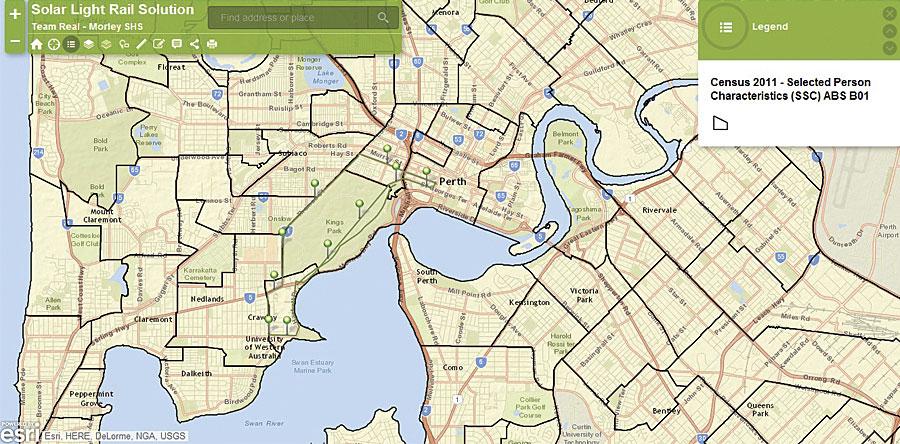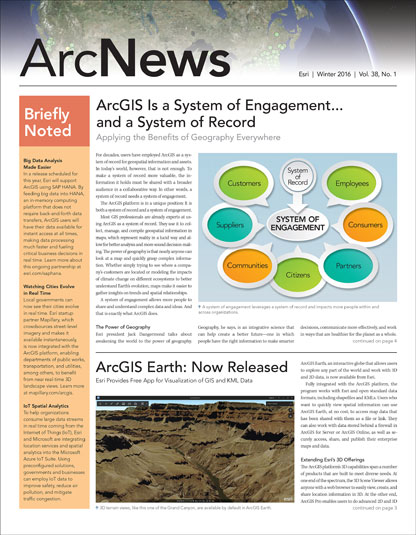Students in Western Australia got a hands-on understanding of how important location is to sustainable living, environmental change, and cultural understanding at the state’s recent junior app development hackathon.
One hundred twenty students from seven high schools in the Perth metropolitan region were brought together in August for HackED, a first-of-its-kind initiative that gave some of the city’s most forward-thinking youth the opportunity to tackle community planning and infrastructure issues using location data.

Hosted by Landgate, Western Australia’s land and property statutory authority, and the Western Australian Land Information System (WALIS), the event encouraged students to tap into their ambitious ideas by building map-based apps using ArcGIS Online. Teams of students developed a range of smart community solutions, connecting innovation with location to improve livability throughout the state.
Solutions included a proposed telecommunications upgrade for Perth, Australia’s fourth most populous city, which would see 5G rolled out across the state capital; an app to help alleviate traffic congestion issues; and a social awareness app relating to the impact humans have on the environment.
Another app, which promoted breaking down cultural barriers by uniting people through common threads, won best pitch of the day. Based on the principles of social media, the app highlighted international events on a world map. It linked countries that recognize the same holidays and festivals and educated users on the unique traditions celebrated in each place.
WALIS director Damian Shepherd said HackED’s overarching aim was to reinforce the importance of science, technology, engineering, and mathematics (STEM) education by creating a progressive new learning environment where real-world, geographic challenges could be addressed.
“Everything happens somewhere, so all of those problems have a location-based element to them,” said Shepherd. “Many of the projects developed by students were centered on building things at a particular location, so they had to think about related services like power and water and whether those resources were readily available. Location helped them address those considerations.”
Shepherd said that once students conceived their solutions, they used ArcGIS Online to help bring those ideas to life.
“While many students started their design work on paper and undertook some research on the web, they still needed to bring their rough ideas together,” he said. “ArcGIS Online allowed them to create a living, breathing picture of their concepts that revealed the interdependencies of various key factors.”
The HackED hosts weren’t looking for highly polished apps, according to Shepherd. Rather, the primary objective was to encourage students to look at problems spatially.
Esri Australia senior consultant Christopher Brown, who helped students flesh out their ideas in ArcGIS Online, was impressed by their ingenuity and teamwork. He was also in awe of the smart, community-minded solutions they developed.
“Once groups became comfortable with ArcGIS, they worked quickly to capture their ideas using the software’s various features,” said Brown. “Some groups were using [Esri] Story Map Journal templates, others were working on more editing-type workflows, but all of them were actively leveraging GIS to work around the development application scenarios.”
Brown said that introducing students to GIS and encouraging them to think spatially helps them see the world’s challenges in a more complete way. He also acknowledged the long-term potential of a number of the students’ projects.
In addition to providing students with a platform to create community solutions, HackED also brought awareness to the Western Australian Whole of Government Open Data Policy.
After realizing that its data was being underused, the Western Australian government introduced the policy in July to help maximize this constantly evolving resource. The aim was to clearly communicate the government’s position on open data, as well as increase understanding of the value the data offers to every member of the community.
Citizens can now access a wealth of data collected by the state. This approach assists scientific research, education, and innovation across various industries while improving the transparency of government activities.
Landgate is already planning HackED 2016 and is looking to expand both the number of participating schools and the number of industry partners involved in the event.

